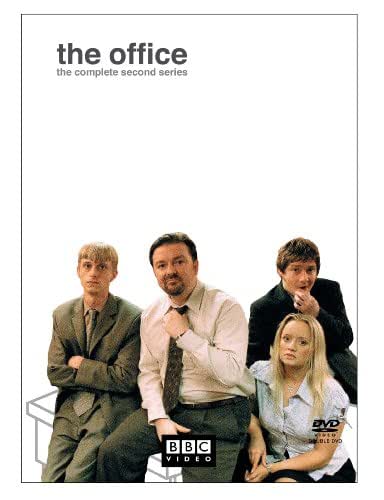Image A Sound A- Extras C+
by Travis Mackenzie Hoover Fans of "The Office" are in for a lopsided evening if they plan to do a marathon of both seasons. Much as I loved series one, there's no denying that it deals purely with the inertia of office life, of living with the petty nuisances of an obnoxious boss (Ricky Gervais as David Brent), a "weasel-faced ass" (Mackenzie Crook as Gareth Keenan) at the desk across from you, and a long stretch of boredom as the mindless work you do stretches on into infinity. Creators Gervais and Stephen Merchant could have easily riffed on this for years and run out of ideas along the way, but wanting to go out with a bang ("The Office" is, by all accounts, finished), they decided to play the series out by throwing the office environment into flux. Thus we have "The Office: The Complete Second Series", a brilliant and unlikely cross between Basil Fawlty and Arthur Miller that starts off subtly hilarious and ends as one of the most wrenching tragedies ever to crash through the small screen.
You'll recall David–the Wernham-Hogg paper company's Slough manager–was the man who worried more about being funny than running his branch; series one was a pseudo-documentary about his total dominion over the office, where his crudeness and narcissism were pervasive and inescapable. Unfortunately, series two finds the Slough and Swindon branches merged, and David now answering to the higher-up Neil Godwin (Patrick Baladi), who is not only a more competent manager, but nicer and–the kicker–funnier than he is. With the new staff finding David a slacker and the old staff gravitating towards Neil, suddenly David's captive audience has dissolved into nothing. He goes to pieces, flirting with becoming a motivational speaker (in one of the show's most devastating episodes) and little by little sowing the seeds of an imminent destruction.
At first, it's deeply satisfying to see David get in trouble over and over again with the new regime: after enduring his hateful smugness in the first series, his comeuppance can only seem like karmic inevitability. But at some point a switch is thrown, and the easy laughs dribble away leaving something more uncomfortable. David ceases to be completely unsympathetic–as bid after bid for attention goes horribly awry, we see how painfully insecure he is, how he clings to a self-image as an entertainer in order to put up with the lonely nothing that his life has become. Like Willy Loman, he desperately wants to be "well-liked" and on top, and like Willy Loman, he can't face the fact that all he's got is all he'll ever get. In a sense, he's as brutalized by the office experience as anyone who works under him. Like them, he would like to be loved more than he wants to work–he just hasn't separated the two concepts.
Fittingly, none of the other core figures of the series gets away clean either, as with the unresolved sexual tension between sensible audience surrogate Tim Canterbury (Martin Freeman) and comely receptionist Dawn Tinsley (Lucy Davis). The relationship is brought to a head by the intrusion of sexy new staff member Rachel: as Tim momentarily denies his love for Dawn, Dawn finds herself torn between a potentially bleak future with her dependable-but-boorish fiancé and the attentions of the attractive but less anchored Tim. Her rationale for settling for lowered expectations is one of the series' most biting moments, the no-exit point that "The Office" has been building towards and which finds its resigned cynicism mirrored in David's frenzied denial.
Perhaps most disquietingly, there is Gareth, supremely clueless Gareth, who experiences no change at all. He's still a misogynist prick who can't see past the four walls of the Slough office, only by the end he has mustered enough power to become a potential despot. Thus the initial comedy of the second series develops into something more existential, presenting the Godardian choice between grief and nothing and offering no third option.
THE DVDWarner/BBC's North American DVD release of "The Office: The Complete Second Series" is close to unimpeachable. The 1.78:1, 16×9 enhanced image is crisp and detailed, making the already austere colours of the series seem that much more icy and cruel–it's a shining example of how a muted palette can be made rich and multidimensional by a careful transfer. The 2.0 stereo sound mix, though obviously limited in speaker options, is nevertheless quite subtle and more creative than that of"The Office: The Complete First Series", as in the crucial scene where Tim defiantly removes his mike and must re-attach it to explain what happened in the interim.
Extras, sadly, aren't quite up to the level of the previous set's. First up is a 20-minute "video diary" that goes from Merchant and Gervais writing the second series and collecting the awards for the first one through the production and editing–mostly people cutting up, cheering for sports teams in between shots, and generally goofing off to the amazement of no one I can think of. A 13-minute reel of deleted scenes follows, most of them rightfully excised for being too broad–things like Gareth wearing too-tight biker shorts or rotund, taciturn Keith (Ewen Mackintosh) making rude gestures in apparent pursuit of Rachel. If nothing else, it shows the good judgement of the production team in weeding out thematic distractions. An 8-minute blooper reel offers little that all other bloopers have not, though it does feature one scene stretching on into 25 takes as Gervais and Freeman continually break into laughter. Rounding out the package: commercials for BBC America and "The Kids in the Hall", as well as an insert booklet containing more British slang for the uninitiated.
30 minutes/episode; NR; 1.78:1 (16×9-enhanced); English DD 2.0 (Stereo); CC; French, Spanish subtitles; DVD-9 + DVD-5; Region One; BBC




